
by Naomi Klein - 3 September 2013. Sub-headings : Harper's one idea, Extractivism, Climate change — Don't look away, Climate change — is happening now, Climate change — is at the heart of all our existing demands, Climate action = the left agenda, How to pay for it, Trade, First nations, Overburden.
Naomi Kein delivered the following speech on September 1, 2013 at the founding convention of UNIFOR, a new mega union created by the Canadian Autoworkers and the Canadian Energy and Paper Workers Union. Full text of the speech follows the video.
I'm so very happy and honoured to be able to share this historic day with you.
The energy in this room — and the hope the founding of this new union has inspired across the country — is contagious.
It feels like this could be the beginning of the fight back we have all been waiting for, the one that will chase Harper from power and restore the power of working people in Canada.
So welcome to the world UNIFOR.
A lot of your media coverage so far has focused on how big UNIFOR is — the biggest private sector union in Canada. And when you are facing as many attacks as workers are in this country, being big can be very helpful. But big is not a victory in itself.
The victory comes when this giant platform you have just created becomes a place to think big, to dream big, to make big demands and take big actions. The kind of actions that will shift the public imagination and change our sense of what is possible.
And it's that kind of "big" that I want to talk to you about today.
Some of you are familiar with a book I wrote called The Shock Doctrine. It argues that over the past 35 years, corporate interests have systematically exploited various forms of mass crises — economic shocks, natural disasters, wars — in order to ram through policies that enrich a small elite, by shredding regulations, cutting social spending and forcing large-scale privatizations.
As Jim Stanford and Fred Wilson argue in their paper laying out UNIFOR's vision, the attacks working people in Canada and around the world are facing right now are a classic case of The Shock Doctrine.
There's no shortage of examples, from the mass slashing of salaries and layoffs of public sector workers in Greece, to the attacks on pension funds in Detroit in the midst of a cooked up bankruptcy, to the Harper government's scapegoating of unions for its own policy failures right here in Canada.
I don't want to spend my time with you proving that this ugly tactic of exploiting public fear for private gain is alive and well. You know it is; you are living it.
I want to talk about how we fight it.
And I'll be honest with you: when I wrote the book, I thought that just understanding how the tactic worked, and mobilizing to resist it, would be enough to stop it. We even had a slogan: "Information is shock resistance. Arm yourself."
But I have to admit something to you: I was wrong. Just knowing what is happening — just rejecting their story, saying to the politicians and bankers: "No, you created this crisis, not us" or "No, we're not broke, it's just that you are hording all the money" may be true but it's not enough.
It's not even enough when you can mobilize millions of people in the streets to shout "We won't pay for your crisis." Because let's face it — we've seen massive mobilizations against austerity in Greece, Spain, Italy, France, Britain. We've occupied Wall Street and Bay Street and countless other streets. And yet the attacks keep coming.
Some of the new movements that have emerged in recent years have staying power, but too many of them arrive, raise huge hopes, and then seem to disappear or fizzle out.
The reason is simple. We are trying to organize in the rubble of a 30 year war that has been waged on the collective sphere and workers rights. The young people in the streets are the children of that war.
And the war has been so complete, so successful, that too often these social movements don't have anywhere to stand. They have to occupy a park or a square to have a meeting. Or they are able to build a power base in their schools, but that base is transient by its nature, they are out in a few years.
This transience makes these movements far too easy to evict simply by waiting them out, or by applying brute state force, which is what has happened in far too many cases.
And this is one of the many reasons why the creation of UNIFOR, and your promise of reviving Social Unionism — building not just a big union but a vast and muscular network of social movements — has raised so much hope.
Because our movements need each other.
The new social movements bring a lot to the table — the ability to mobilize huge numbers of people, real diversity, a willingness to take big risks, as well as new methods of organizing including a commitment to deep democracy.
But these movements also need you — they need your institutional strength, your radical history, and perhaps most of all, your ability to act as an anchor so that we don't keep rising up and floating away.
We need you to be our fixed address, our base, so that next time we are impossible to evict.
And we also need your organizing skills. We need to figure out together how to build sturdy new collective structures in the rubble of neoliberalism. Your innovative idea of community chapters is a terrific start.
It's also important to remember that you are not starting from scratch. A remarkable group of people gathered a little less than a year ago for the Port Elgin Assembly and produced what they called the Making Waves agenda.
The most important message to come out of that process is that our coalitions cannot just be about top-down agreements between leaders; the change has to come from the bottom up, with full engagement from members.
And that means investing in education. Education about the ideological and structural reasons why we have ended up where we are. If we are going to build a new world, our foundation must be solid.
It also means getting out there and talking to people face to face. Not just the public, not just the media, but re-invigorating your own members with the analysis we share.
But there's something else too. Another reason why we can't seem to win big victories against the Shock Doctrine.
Even when there is mass resistance to an austerity agenda, and even when we understand how we got here, something is stopping us — collectively — from fully rejecting the neoliberal agenda.
And I think what it is is that we don't fully believe that it's possible to build something in its place. For my generation, and younger, deregulation, privatization and cutbacks is all we've ever known.
We have little experience building or dreaming. Only defending. And this is what I've come to understand as the key to fighting the Shock Doctrine.
We can't just reject the dominant story about how the world works. We need our own story about what it could be.
We can't just reject their lies. We need truths so powerful that their lies dissolve on contact with them. We can't just reject their project. We need our own project.
Now, we know Stephen Harper's project — he has only one idea for how to build our economy.
Dig lots of holes, lay lots of pipe. Stick the stuff from the pipes onto ships — or trucks, or railway cars — and take it to places where it will be refined and burned. Repeat, but more and faster. Before anyone figures out that this is his one idea, and what has allowed him to maintain the illusion that he is some kind of responsible economic manager, while the rest of the economy falls apart.
It's why it's so important to this government to accelerate oil and gas production at an outrageous pace, and why it has declared war on everyone standing in the way, whether environmentalists or First Nations or other communities.
It's also why the Harper government is willing to sacrifice the manufacturing base of this country, waging war on workers, attacking your most basic collective rights.
This is not just about extracting specific resources — Harper represents an extreme version of a particular worldview. One that I sometimes call "extractivism". And others times simply call capitalism.
It's an approach to the world based on taking and taking without giving back. Taking as if there are no limits to what can be taken — no limits to what workers' bodies can take, no limits to what a functioning society can take, no limits to what the planet can take.
In the extractivist mindset, labour is a commodity just like the bitumen. And maximum value must be extracted from that resource — ie you and your members — regardless of the collateral damage. To health, families, social fabric, human rights.
When crisis hits, there is only ever one solution: take some more, faster. On all fronts.
So that is their story — the one we're trapped in. The one they use as a weapon against all of us.
And if we are going to defeat it, we need our own story.
So I want to offer you what I believe to be the most powerful counter-narrative to that brutal logic that we have ever had.
Here it is: our current economic model is not only waging war on workers, on communities, on public services and social safety nets. It's waging war on the life support systems of the planet itself. The conditions for life on earth.
Climate change. It's not an "issue" for you to add to the list of things to worry about it. It is a civilizational wake up call. A powerful message — spoken in the language of fires, floods, storms and droughts — telling us that we need an entirely new economic model, one based on justice and sustainability.
It's telling us that when you take you must also give, that there are limits past which we cannot push, that our future health lies not in digging ever deeper holes but in digging deeper inside ourselves — to understand how ALL our fates are interconnected.
Oh, and one last thing. We need to make this transition, like, yesterday. Because our emissions are going in exactly the wrong direction and there's very little time left.
Now I know talking about climate change can be a little uncomfortable for those of you working in the extractive industries, or in manufacturing sectors producing carbon-intensive products like cars and planes.
I also know that despite your personal fears, you haven't joined the deniers like some of your counterparts in the U.S. — both of your former unions have all kinds of great climate policies on the books.
And this isn't some recent conversion either: the CEP courageously fought for Kyoto all the way back in the 90s. The CAW has been fighting against the environmental destruction of free trade deals even longer. [Former CEP President] Dave Coles even got arrested protesting the Keystone XL pipeline. That was heroic.
But...how to say this politely?...I think it's fair to say that climate change hasn't traditionally been your members greatest passion.
And I can relate: I'm not an environmentalist. I've spent my adult life fighting for economic justice, inside our country and between countries. I opposed the WTO not because of its effects on dolphins but because of its effects on people, and on our democracy.
The case I want to make to you is that climate change — when its full economic and moral implications are understood — is the most powerful weapon progressives have ever had in the fight for equality and social justice.
But first, we have to stop running away from the climate crisis, stop leaving it to the environmentalist, and look at it. Let ourselves absorb the fact that the industrial revolution that led to our society's prosperity is now destabilizing the natural systems on which all of life depends.
I'm not going to bore you with a whole bunch of numbers. Though I could remind you that the World Bank says we're on track for a four degrees warmer world. That the International Energy Agency — not exactly a protest camp of green radicals — says the Bank is being too optimistic and we're actually in for 6 degrees of warming this century, with "catastrophic implications for all of us". That's an understatement: we haven't even reached a full degree of warming yet and look at what is already happening.
97% of the Greenland ice-sheet's surface was melting last summer — as Bill McKibben says, we've taken one of the great features of the planet and broken it.
And then there are the extreme weather events. Hell, I was in Fort McMurray this summer and the contents of the town's museum — literally, its history — was floating around in the water.
I was trying to get interviews with the big oil companies but their headquarters in Calgary were all empty as the downtown was dark and the city was frantically bailing out from the worst flood it has ever seen.
And not even the provincial NDP had the courage to say: this is what climate change looks like and we are going to have a lot more of it if those oil companies get their way.
We know that this climate emergency is only getting more dire. And our excuses about why we can't do anything about it — why it's somebody else's issue — are melting away.
But engaging on climate does not mean dropping everything else you are doing and turning into a raving environmentalist.
Because I know that the fights you are already waging against austerity, against new free trade deals, against attacks on unions have never been more important.
Which is why I'm not calling you to drop anything.
Climate change — is at the heart of all our existing demands
My argument is that the climate threat makes the need to fight austerity all the more pressing, since we need public services and public infrastructure to both bring down our emissions and prepare for the coming storms.
Far from trumping other issues, climate change vindicates much of what the left has been demanding for decades.
In fact, climate change turbo-charges our existing demands and gives them a basis in hard science. It calls on us to be bold, to get ambitious, to win this time because we really cannot afford any more losses. It enflames our vision of a better world with existential urgency.
What I'm going to show you is that confronting the climate crisis requires that we break every rule in the free-market playbook — and that we do so with great urgency.
So I'm going to quickly lay out what I believe a genuine climate action plan would look like. And it's not the market-driven non-sense we hear from some of the big green groups in the U.S. — changing your light bulbs, or carbon trading and offsetting. This is the real deal, getting at the heart of why our emissions are soaring.
And you will notice that a lot this will sound familiar. That's because much of this agenda is already embraced in the vision of your new union, not to mention everything you have been fighting for in the past.
First of all, we need to revive and reinvent the public sphere. If we want to lower our emissions, we need subways, streetcars and clean-rail systems that are not only everywhere but affordable to everyone.
We need energy-efficient affordable housing along those transit lines. We need smart electrical grids carrying renewable energy. We need garbage collection that has, as its goal, the elimination of garbage.
And we don't just need new infrastructure. We need major investments in the old infrastructure to cope with the coming storms. For decades we have fought against the steady starving of the public sphere.
Again and again we've seen how those decades of cuts have left us more vulnerable to climate disasters: superstorms bursting through decaying levees, heavy rain washing sewage into lakes, wildfires raging as fire crews are underpaid and understaffed. Bridges and tunnels buckling under the new reality of heavy weather.
Far from taking us away from the fight for a robust public sphere, climate change puts us right in the middle of it — but this time armed with arguments that raise the stakes significantly. It is not hyperbole to say that our future depends on our ability to do what we have so long been told we can no longer do: act collectively. And who better than unions to carry that message?
The renewal of the public sphere will create millions of new, high paying union jobs — jobs in fields that don't hasten the warming of the planet.
But it's not just boilermakers, pipefitters, construction workers and assembly line workers who get new jobs and purpose in this great transition.
There are big parts of our economy that are already low-carbon.
They're the parts facing the most disrespect, demeaning attacks and cuts. They happen to be jobs dominated by women, new Canadians, and people of colour.
And they're also the sectors we need to expand massively: the care-givers, educators, sanitation workers, and other service sector workers. The very ones that your new union has pledged to organize. The low-carbon workers who are already here, demanding living wages and respect. Turning low-paying low-carbon jobs into higher-paying jobs is itself a climate solution and should be recognized as such.
Here I think we should take inspiration from the fast-food workers in the United States and their historic strikes this past week. They are showing how this organizing can be done. Maybe it will turn out to be the first uprising in a sustained rebellion fighting for both real wages and real food! One in which the health of the workers and the health of society are inextricably linked.
It should be clear by now that I am not suggesting some half-assed token "green jobs" program. This is a green labour revolution I'm talking about. An epic vision of healing our country from the ravages of the last 30 years of neoliberalism and healing the planet in the process.
Environmentalists can't lead that kind of revolution on their own. No political party is rising to the challenge. We need you to lead.
So the big question is: how are we going to pay for all this?
I mean, we're broke, right? Or so our government is always telling us.
But with stakes this high, crying broke isn't going to cut it. We know that it's always possible to find money to bail out banks and start new wars. So that means we have to go to where the money is, and the money is with the fossil fuel companies and the banks that finance them. We have to get our hands on some of their super profits to help clean up the mess they made. It's a simple concept, well established in law: the polluter pays.
We know we can't get the money by continuing to extract more. So as we wind down our dependence on fossil fuels, as we extract LESS, we have to keep MORE of the profits.
There's lots of ways to do that. A national carbon tax and higher royalties are the most obvious. A financial transaction tax would be a big help. Raising corporate taxes across the board would too.
When you do that, suddenly, digging holes and laying pipe isn't the only option on the table.
Quick example. A recent study from the CCPA compared the public value from a five billion dollar pipeline — Enbridge Gateway for instance — and the value from the same amount of money invested in green economic development.
Spend that money on a pipeline, you get mostly short-term construction jobs, big private sector profits, and heavy public costs for future environmental damage.
Spend that money on public transit, building retrofits and renewable energy, and you get, at the very least, three times as many jobs...not to mention a safer future. The actual number of jobs could be many times more than that, according to their modeling. At the highest end, green investment could create 34 times more jobs than just building another pipeline.
And how do you raise five billion dollars for public investments like that? A minimal national carbon tax of ten dollars a tonne would do the trick. And there would be five billion new dollars every year. Unlike the one-off Enbridge put on the table.
Environmentalists, and I include myself here, have to do a much better job of not just saying no to projects like Northern Gateway but also forcefully saying yes to our solutions about how to build and finance green infrastructure.
Now: these alternatives makes perfect sense on paper, but in the real world, they slam headlong into the dominant ideology that tells us that we can't increase taxes on corporations, that we can't say no to new investment, and moreover, that we can't actively decide what kind of economy we want — that we are supposed to leaving it all to the magic of the market.
Well — we've seen how the private sector manages this crisis. It's time to get back in there. This transition needs to be publicly managed. And that will mean everything from new crown corporations in energy, to a huge re-distribution of power, infrastructure and investment.
A democratically-controlled, de-centralized energy system operated in the public interest. This agenda is increasingly being described as "energy democracy" and it's not a new idea in the union world — Sean Sweeney of the Global Labor Institute at Cornell University is here today, and many fine trade unions — including CEP - have been working on this agenda for years. It's time to turn energy democracy into a reality here in Canada. "Power to the people" is a terrific slogan to start with.
As you all know, there have been some modest attempts by provincial governments to play a more activist role in bringing about a green transition, while resisting the pressure to double down on dirty energy.
But in those cases, we're starting to see something very disturbing. In the provinces where governments have taken the most positive, bold action, they're getting dragged into trade court.
And that brings me to the last piece of a real progressive climate agenda.
It's time to rip up so-called Free Trade deals once and for all. And we sure as hell can't be signing new ones.
You've fought them for decades now, since the CAW played such a pivotal role in the battle against the first Free Trade deal with the US. You've fought them because they undermine workers rights both here and abroad, because they drive a race to the bottom, because they hyper-empower corporations.
And you were right — even more right than you knew. Because not only is corporate globalization largely responsible for soaring emissions, but now the logic of free trade is directly blocking us from making the specific changes needed to reduce climate chaos in response.
A couple of quick examples.
Ontario's Green Energy plan is far from perfect. But it has a very sensible "buy local" provision so that wind and solar projects in Ontario actually deliver jobs and economic benefits to local communities. It's the core principle of a just transition.
Well, the World Trade Organization has decided that this measure is illegal.
The CAW is already in a coalition fighting back — but more green policies will face the same corporate challenges.
Here's another example. Quebec banned fracking — a courageous move that has been taken up by two consecutive governments.
But a US drilling company is planning to sue Canada for $250- million dollars under NAFTA's Chapter 11, claiming the ban interferes with its "valuable right to mine for oil and gas under the St. Lawrence river."
We should have seen this coming. A WTO official was quoted almost a decade ago, saying that the WTO enables challenges against "almost any measure to reduce greenhouse gas emissions."
In other words, these maniacs think trade should trump everything, including the planet itself. If there has ever been an argument to stop this madness, climate change is it.
The battle lines have never been clearer. Climate change is the argument that must trump all others in the battle against corporate free trade. I mean, sorry guys, but the health of our communities and our planet is just a little more important than your god-given right to obscene profits.
These are moral arguments we can win.
And we don't have to wait for governments to give us permission. Next time they close a factory making fossil-fuel machinery — whether cars, tractors, or airplanes — don't let them do it.
Do what workers are doing from Argentina to Greece to Chicago: occupy the factory. Turn it into a green worker co-op. Go beyond negotiating a last, sad severance. Demand the resources — from companies and governments — to start building the new economy right now.
Whether that's electric trains or windmills. Watch that factory turn into a beacon for students, anti-poverty activists, environmentalists, First Nations. All fighting together for that vision.
Climate change is a tool. Pick it up and use it. Use it to demand the supposedly impossible.
It's not a threat to your jobs, it's the key to liberation from a logic that is already waging a war on the entire concept of dignified work.
So all we need is the political power to make this vision a reality. And that power can be built on the urgency and science of the climate crisis.
If we stay true to a clear vision that these changes are what is required to stave off an ecological collapse, then we will change the conversation.
We'll escape from the clutches of narrow free-market economics, where we are constantly told to ask for less and expect less and we will find ourselves in a conversation about morality — about what kind of people we want to be, about what kind of world we want for ourselves and our kids.
If we set the terms of that conversation, we back Stephen Harper up against the wall.
We finally hold him accountable for the lethal ideology he serves — the one that he has been hiding behind that bland and boring mask of his.
That's how you shift the balance of forces in this country.
If UNIFOR becomes the voice for a boldly different economic model, one that provides solutions to the attacks on working people, on poor people, and the attacks on the Earth itself, then you can stop worrying about your continued relevance.
You will be on the front lines of the fight for the future, and everyone else — including the opposition parties — will have to follow or be left behind.
I believe that a key to this shift is deepening your alliance with First Nations, whose constitutionally guaranteed title to land and resources is the biggest legal barrier Harper faces to his vision of Canada as an extraction and export machine — a country-sized sacrifice zone.
As my friend Clayton Thomas Mueller says, imagine if the workers and First Nations actually joined forces in a meaningful coalition — the rightful owners of the land, side by side with the people working the mines and pipelines, coming together to demand another economic model?
People and the earth itself on one side, predatory capitalism on the other.
The Harper Tories wouldn't know what hit them.
But this is about more than strategic alliances. As we tell our own story of a different Canada to stand up to Harper's story about endless extraction, we will need to learn from the Indigenous worldview. The one that understands that you can't just take and take, but also care-take, and give back whenever you harvest. That five-year-plans are for kids, and grownups think about seven generations. A worldview that reminds us that there are always unforeseen consequences because everything is connected.
Because building the kinds of deep coalitions that we need begins with identifying the threads that connect all of our struggles. And indeed that recognize they are the SAME struggle.
I want to leave you with a word that might help. Overburden.
When I was in the tar sands earlier this summer, I kept thinking about it. Overburden is the word used by mining companies to describe the "waste earth covering a mineral deposit."
But mining companies have a strange definition of waste. It includes forests, fertile soil, rocks, clay — basically anything that stands between them and the gold, copper, or bitumen they are after.
Overburden is the life that gets in the way of money. Life treated as garbage.
As we passed pile after pile of masticated earth by the side of the road, it occurred to me that it wasn't just the dense and beautiful Boreal forest that was "overburden" to these companies.
We are all overburden. That's certainly the way the Harper government sees us.
-
Unions are overburden since the rights you have won are a barrier to unfettered greed.
-
Environmentalists are overburden, because they are always going on about climate change and oil spills.
-
Indigenous people are overburden, since their rights and court challenges get in the way.
-
Scientists are overburden, since their research proves what I've been telling you.
-
Democracy itself is overburden to our government — whether it's the right of citizens to participate in an environmental assessment hearing, or the right of Parliament to meet and debate the future of the country.
This is the world deregulated capitalism has created, one in which anyone and anything can find themselves discarded, chewed up, tossed on the slag heap.
But "overburden" has another meaning. It also means, simply, "to load with too great a burden"; to push something or someone beyond their limits.
And that's a very good description of what we're experiencing too.
Our crumbling infrastructure is overburdened by new demands and old neglect.
Our workers are overburdened by employers who treat their bodies like machines.
Our streets and shelters are overburdened by those whose labour has been deemed disposable.
The atmosphere is overburdened with the gasses we are spewing into it.
And it is in this context that we are hearing shouts of "enough!" from all quarters. This much and NO further.
We heard it from the fast food worker in Milwaukee, who went on strike this week holding a sign saying, "I am worth more" and helped set off a national debate about inequality.
We heard it from the Quebec Students last summer, who said "No" to a tuition increase and ended up unseating a government and sparking a national debate about the right to free education.
We heard it from the four women who said "No" to Harper's attacks on environmental protections and indigenous rights, pledging to be Idle No More, and ended up setting off an indigenous rights uprising across North America.
And we are hearing "Enough" from the planet itself as it fights back in the only ways it can.
Everywhere, life is reasserting itself. Insisting that it is not overburden.
We are starting to realize that not only have we had enough — but that there is enough.
To quote Evo Morales, there is enough for all of us to live well. There just isn't enough for some of us to live better and better.
To close off, I want to read an excerpt from Article 2 of your brand new constitution.
Words that many of us have been waiting a very long time to hear. Words that you may have already heard today, but they bear repeating. Here goes...
"Our goal is transformative. To reassert common interest over private interest.
Our goal is to change our workplaces and our world. Our vision is compelling.
It is to fundamentally change the economy, with equality and social justice, restore and strengthen our democracy and achieve an environmentally sustainable future.
This is the basis of social unionism — a strong and progressive union culture and a commitment to work in common cause with other progressives in Canada and around the world."
Brothers and Sisters, all I would add is: don't say it if you don't mean it.
Because we really, really need you to mean it.
Thank you.
END
 NATALIE MORRIS (The Redacted Inc): Well, the province of Alberta, in Canada published a damning report about the covid pandemic, basically admitting they got it all wrong - the vaccines, the masks, the lockdowns - it's an amazing admission from a government agency.
NATALIE MORRIS (The Redacted Inc): Well, the province of Alberta, in Canada published a damning report about the covid pandemic, basically admitting they got it all wrong - the vaccines, the masks, the lockdowns - it's an amazing admission from a government agency. 
 One of many interesting parts of Tucker Carlson's interview with Vladimir Putin was Putin's explanation of what he means by needing to stop the Nasification of Ukraine.
One of many interesting parts of Tucker Carlson's interview with Vladimir Putin was Putin's explanation of what he means by needing to stop the Nasification of Ukraine. 1.The Chinese Ministry of Foreign Affairs published a document on the history of U. S. genocide against Native Americans on their official website. Currently trending on Weibo, and being promoted by People’s Daily and other major media accounts. Yesterday, a recent documentary about U. S. military experiments on Danish children during the 1960s was one of the major trending items.
1.The Chinese Ministry of Foreign Affairs published a document on the history of U. S. genocide against Native Americans on their official website. Currently trending on Weibo, and being promoted by People’s Daily and other major media accounts. Yesterday, a recent documentary about U. S. military experiments on Danish children during the 1960s was one of the major trending items. Nobel Peace Prize winning economist Milton Friedman once said that you can have mass immigration or you can have the welfare state. But you can't have both.
Nobel Peace Prize winning economist Milton Friedman once said that you can have mass immigration or you can have the welfare state. But you can't have both. 

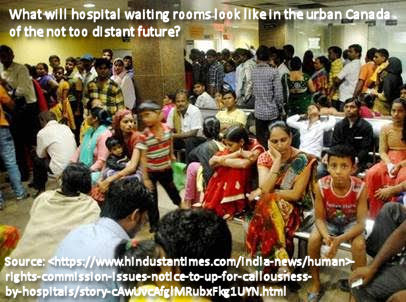

 I must admit that I am excited. After 17 years in office, the BC Liberals were denied a majority of seats in the May election. But the news got even better. The social democratic party, the NDP, also fell short of the mark. Suddenly, after more than six decades of one party dictatorship, a third party found itself holding the balance of power. It was the BC Greens, who doubled their popular vote and tripled their representation in the House. A spectacular achievement.
I must admit that I am excited. After 17 years in office, the BC Liberals were denied a majority of seats in the May election. But the news got even better. The social democratic party, the NDP, also fell short of the mark. Suddenly, after more than six decades of one party dictatorship, a third party found itself holding the balance of power. It was the BC Greens, who doubled their popular vote and tripled their representation in the House. A spectacular achievement. A year ago, like a herd of buffalo being stampeded toward a cliff, people in my neck of the woods were convinced that "we must get rid of Harper" in order to "save the environment." When I asked such people what it was that Harper was doing that was so damaging to the environment, they all spewed the party line. "He's stripped the country of all environmental regulations." It came out like a programmed response. However, when I asked them to give me a specific example, without exception, no one could tell me. No one could name a single one of those environmental "regulations".
A year ago, like a herd of buffalo being stampeded toward a cliff, people in my neck of the woods were convinced that "we must get rid of Harper" in order to "save the environment." When I asked such people what it was that Harper was doing that was so damaging to the environment, they all spewed the party line. "He's stripped the country of all environmental regulations." It came out like a programmed response. However, when I asked them to give me a specific example, without exception, no one could tell me. No one could name a single one of those environmental "regulations".


 I am writing today to make three comments on your e-mail message to me, entitled “New Democrats on War in Iraq and Syria.”
I am writing today to make three comments on your e-mail message to me, entitled “New Democrats on War in Iraq and Syria.”
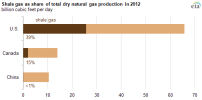 In a press release entitled, "North America leads the world in production of shale gas," the US Energy Information Administration (EIA) boasts long and loud that US gas quantities extracted by fracking shale beds vastly exceed production in Canada and China. Energy resources analysts, however, are critical that the EIA never releases balanced accounts on petroleum and gas production which would reveal the growing costs of extraction.
In a press release entitled, "North America leads the world in production of shale gas," the US Energy Information Administration (EIA) boasts long and loud that US gas quantities extracted by fracking shale beds vastly exceed production in Canada and China. Energy resources analysts, however, are critical that the EIA never releases balanced accounts on petroleum and gas production which would reveal the growing costs of extraction.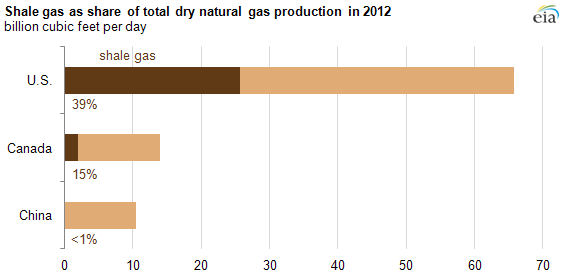

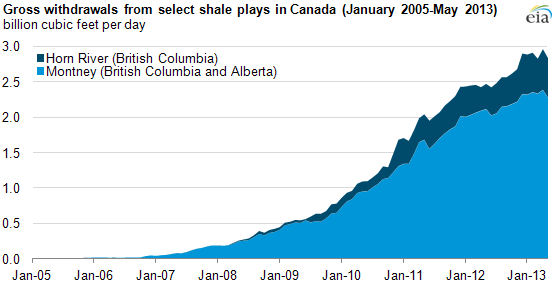
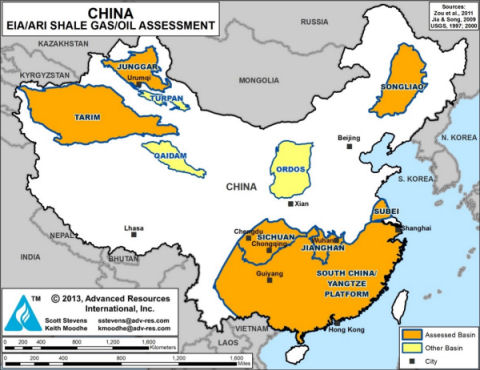

 What's wrong with the Canadian Environmental Movement? Why don't Canadian environmental organisations protest about the huge impact of successive government's policies to promote mass immigration to Canada? The six million more people imported to Canada since 1991 would account for four times as much GHG emissions as the Alberta tar sands project. Overpopulation is the number one issue that multiplies every other impact. Why is this message of the original promoter of Earth Day forgotten today?
What's wrong with the Canadian Environmental Movement? Why don't Canadian environmental organisations protest about the huge impact of successive government's policies to promote mass immigration to Canada? The six million more people imported to Canada since 1991 would account for four times as much GHG emissions as the Alberta tar sands project. Overpopulation is the number one issue that multiplies every other impact. Why is this message of the original promoter of Earth Day forgotten today?
 Canada is at the mercy of ruthless growth-merchants, just like Australia. Until recently, however, counter-growthism Canadians seemed to be almost totally unrepresented in their local, provincial and national press. Candobetter Free Press was therefore interested when news came our way of an exchange between growthists and counter-growthists on the British Columbian island of North Saanich. Another counter-growthist writer,
Canada is at the mercy of ruthless growth-merchants, just like Australia. Until recently, however, counter-growthism Canadians seemed to be almost totally unrepresented in their local, provincial and national press. Candobetter Free Press was therefore interested when news came our way of an exchange between growthists and counter-growthists on the British Columbian island of North Saanich. Another counter-growthist writer, 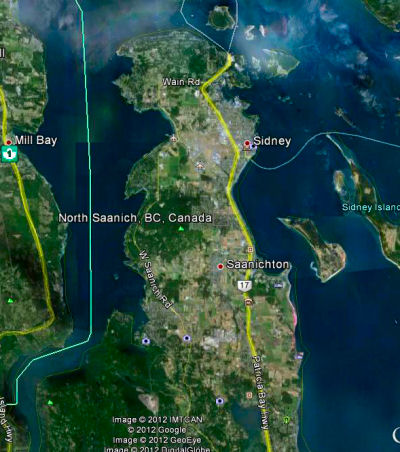
 Two thousand “Temporary” Foreign Workers ---Chinese miners---are coming to extract coal from northeastern British Columbia, Canada, close to three First Nations reserves who suffer unemployment rates over 70% !
Two thousand “Temporary” Foreign Workers ---Chinese miners---are coming to extract coal from northeastern British Columbia, Canada, close to three First Nations reserves who suffer unemployment rates over 70% !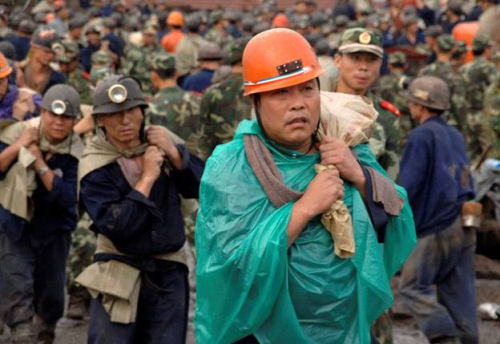
 Australia and Canada are in a race to the bottom to dig up all their minerals. They are importing workers and failing to train their own. Their politicians are caught up in the myth of sustainable economic growth. "The tar sands are the engine of that growth. And we'll want top dollar for what we export because the thirst for tax revenue is insatiable. We'll want the Americans to compete with the Chinese for the privilege of burning our bounty of black death. No wonder then that the support for continued mass immigration is bipartisan. We are in a big hurry to get that resource out of the ground and get it shipped out ASAP---so we bringing in migrant labour like mad to satisfy a "shortage" in skilled labour that we assume to exist because we have never conducted a proper inventory nor seriously tried to train our own people."
Australia and Canada are in a race to the bottom to dig up all their minerals. They are importing workers and failing to train their own. Their politicians are caught up in the myth of sustainable economic growth. "The tar sands are the engine of that growth. And we'll want top dollar for what we export because the thirst for tax revenue is insatiable. We'll want the Americans to compete with the Chinese for the privilege of burning our bounty of black death. No wonder then that the support for continued mass immigration is bipartisan. We are in a big hurry to get that resource out of the ground and get it shipped out ASAP---so we bringing in migrant labour like mad to satisfy a "shortage" in skilled labour that we assume to exist because we have never conducted a proper inventory nor seriously tried to train our own people."
 Although First Nations are still dealing with the adverse effects of Colonization and Residential Schools, a new threat looms on the horizon. As Statistics Canada figures imply, immigration could likely be the next great obstacle that Canada's First People have to overcome in the fight to improve their lives.
Although First Nations are still dealing with the adverse effects of Colonization and Residential Schools, a new threat looms on the horizon. As Statistics Canada figures imply, immigration could likely be the next great obstacle that Canada's First People have to overcome in the fight to improve their lives.

 It is a Canada where the unimaginable becomes real and the impossible becomes possible. They’re here! They’re here I tell you! Why can’t you see the Digital Generation has been stolen and replaced by replicas who look like real Canadians but are in fact programmed to follow an anti-Canadian agenda?
It is a Canada where the unimaginable becomes real and the impossible becomes possible. They’re here! They’re here I tell you! Why can’t you see the Digital Generation has been stolen and replaced by replicas who look like real Canadians but are in fact programmed to follow an anti-Canadian agenda? 
 Too often we fail to see the connection between the ecological destruction and cultural genocide of so-called "developing" nations and the lax immigration policies of those nations like Canada which play host to both the victims and the perpetrators of the tragedy. A look at the relationship between Sarawak's plight and the inflation of real estate values in Ontario, Canada and elsewhere should give us a better understanding of how plunder abroad promotes in-migration here. Canada, by offering an outlet to dirty money and the people who profit from it, must be seen as a willing accomplice and silent partner to a vast money-laundering operation.
Too often we fail to see the connection between the ecological destruction and cultural genocide of so-called "developing" nations and the lax immigration policies of those nations like Canada which play host to both the victims and the perpetrators of the tragedy. A look at the relationship between Sarawak's plight and the inflation of real estate values in Ontario, Canada and elsewhere should give us a better understanding of how plunder abroad promotes in-migration here. Canada, by offering an outlet to dirty money and the people who profit from it, must be seen as a willing accomplice and silent partner to a vast money-laundering operation.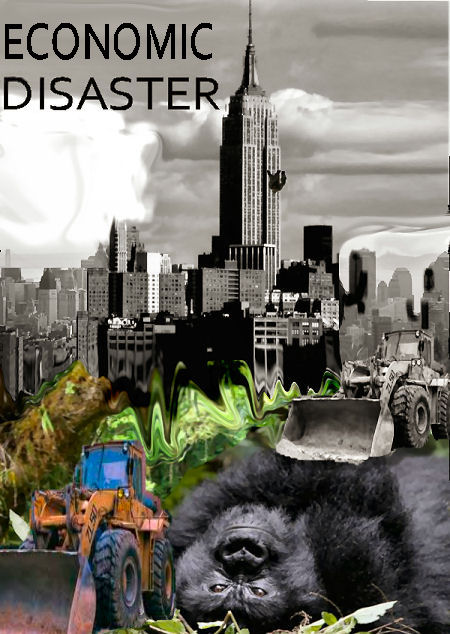
 Tim Murray reports on a recent Canadian census and the public reaction in a voting poll to uncontrolled population growth. He asks why politicians seem to do the opposite of what the Canadian voters actually want.
Tim Murray reports on a recent Canadian census and the public reaction in a voting poll to uncontrolled population growth. He asks why politicians seem to do the opposite of what the Canadian voters actually want.
 The release of Canada's latest Census report should have given the environmental establishment the opportunity to blow the whistle on the government's immigration policy. It would be the ideal "teachable moment" to restore "population" to the position it once held in the environmental discussion, and to resurrect the call for the development of a Population Plan for this nation. But once again, as happened in 2007, they have nothing to say. Not a word. Not a peep. Just what their corporate benefactors want to hear.
The release of Canada's latest Census report should have given the environmental establishment the opportunity to blow the whistle on the government's immigration policy. It would be the ideal "teachable moment" to restore "population" to the position it once held in the environmental discussion, and to resurrect the call for the development of a Population Plan for this nation. But once again, as happened in 2007, they have nothing to say. Not a word. Not a peep. Just what their corporate benefactors want to hear.
 As was the case in 2007 when the previous Census Report revealed that Canada led all G8 countries in population growth, the results of this latest Census Report for 2006-2011 were greeted by media commentators and politicians alike with glee. It is as if we had won a trophy for achievement. But growth is not a solution, it is the root of our problems, and Canada's rapid population growth rate is cause for shame, not pride.
As was the case in 2007 when the previous Census Report revealed that Canada led all G8 countries in population growth, the results of this latest Census Report for 2006-2011 were greeted by media commentators and politicians alike with glee. It is as if we had won a trophy for achievement. But growth is not a solution, it is the root of our problems, and Canada's rapid population growth rate is cause for shame, not pride.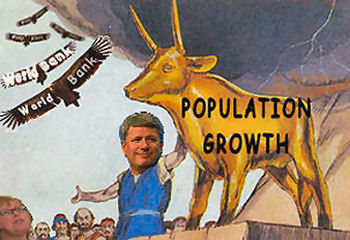
 It is logically contradictory for pro-immigrationists to argue that immigrants should be afforded all the rights that people in their adopted country enjoy, then to argue that they do not have the same right to insist on a sustainable population. Do people in a theatre forfeit the right to complain that the theatre or restaurant manager has allowed it to become too crowded, that the number of patrons has obviously exceeded safety?
It is logically contradictory for pro-immigrationists to argue that immigrants should be afforded all the rights that people in their adopted country enjoy, then to argue that they do not have the same right to insist on a sustainable population. Do people in a theatre forfeit the right to complain that the theatre or restaurant manager has allowed it to become too crowded, that the number of patrons has obviously exceeded safety?
 Martin Collacott from the Fraser Institute looks at whether meaningful immigration reform is finally coming to Canada - video newslink.
Martin Collacott from the Fraser Institute looks at whether meaningful immigration reform is finally coming to Canada - video newslink.
 "Common Dreams" is one of the plethora of so called "progressive" organizations that masquerade as grassroots movements of opposition to the corporate agenda---except that part of the corporate agenda which is most vital to corporate ambitions: the unfettered movement of capital and PEOPLE across borders. Apparently, to be "progressive" in America is to support the displacement of indigenous workers or the suppression of their wages through the relentless flow of cheap imported labour---legal or illegal. It is an attitude common to even to those in the Occupy movement . Such is the perverse mentality of a generation that has been fed a sanitized version of history purged of the anti-immigration sentiments expressed by icons like Caesar Chavez, black Congressional Rep Barbara Jordan and the founder of Earth Day, Democratic Senator Gaylord Nelson. Forty years ago, a progressive was someone who understood that population growth was bad news for both for the environment and the working class. Today, like so many other words, it has come to mean something entirely different, and the cause it serves has become obsessed with fund-raising.
"Common Dreams" is one of the plethora of so called "progressive" organizations that masquerade as grassroots movements of opposition to the corporate agenda---except that part of the corporate agenda which is most vital to corporate ambitions: the unfettered movement of capital and PEOPLE across borders. Apparently, to be "progressive" in America is to support the displacement of indigenous workers or the suppression of their wages through the relentless flow of cheap imported labour---legal or illegal. It is an attitude common to even to those in the Occupy movement . Such is the perverse mentality of a generation that has been fed a sanitized version of history purged of the anti-immigration sentiments expressed by icons like Caesar Chavez, black Congressional Rep Barbara Jordan and the founder of Earth Day, Democratic Senator Gaylord Nelson. Forty years ago, a progressive was someone who understood that population growth was bad news for both for the environment and the working class. Today, like so many other words, it has come to mean something entirely different, and the cause it serves has become obsessed with fund-raising.
 How ironic. A party that poses as the vanguard of democratic reform denies its own membership the chance of greater democratic participation. Why?
How ironic. A party that poses as the vanguard of democratic reform denies its own membership the chance of greater democratic participation. Why? 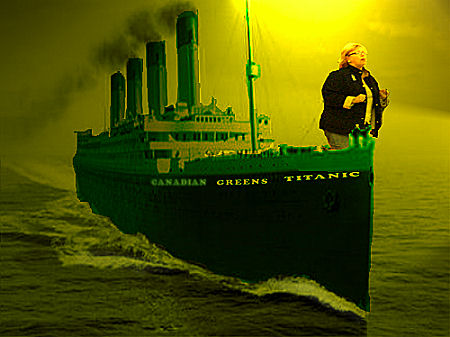
 October 31st, 2011, was a "teachable" moment, one of those moments that come so infrequently that they must therefore be seized and exploited to the fullest extent to increase public awareness. That was the day that, according to demographers, we reached an awful milestone, the day that our species became 7 billion in number. If you expected David Suzuki to use that event to highlight the problem of overpopulation, your expectations would have been cruelly dashed. Dr. Suzuki instead chose to spout the Monbiot line. Overpopulation is not the problem, you see. Its overconsumption by you know who.
October 31st, 2011, was a "teachable" moment, one of those moments that come so infrequently that they must therefore be seized and exploited to the fullest extent to increase public awareness. That was the day that, according to demographers, we reached an awful milestone, the day that our species became 7 billion in number. If you expected David Suzuki to use that event to highlight the problem of overpopulation, your expectations would have been cruelly dashed. Dr. Suzuki instead chose to spout the Monbiot line. Overpopulation is not the problem, you see. Its overconsumption by you know who.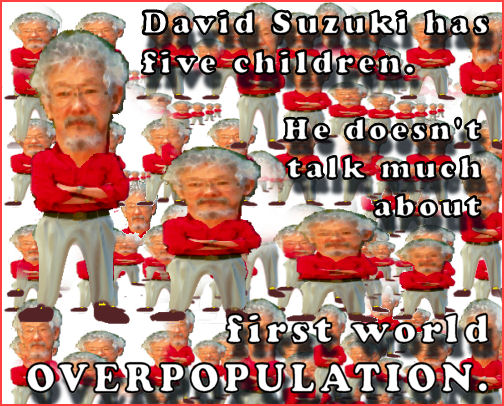
 On October 29, CBC Radio's Quirks and Quarks featured two guests to discuss the world at 7 billion people, Robert Engelman, President of the Worldwatch Institute in Washington and Madeline Weld, President of the Population Institute of Canada.
On October 29, CBC Radio's Quirks and Quarks featured two guests to discuss the world at 7 billion people, Robert Engelman, President of the Worldwatch Institute in Washington and Madeline Weld, President of the Population Institute of Canada.
Recent comments